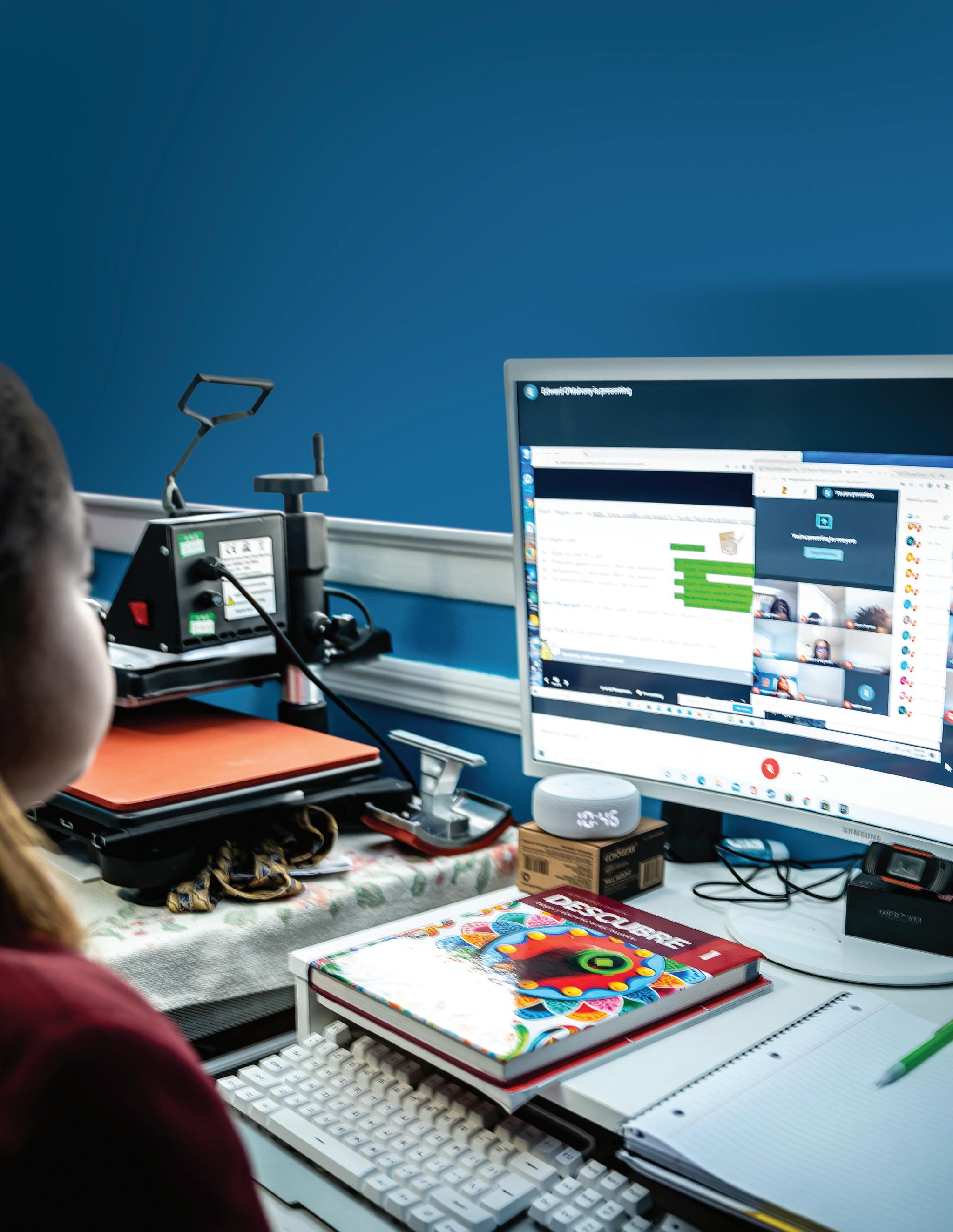
14 minute read
Bishop McNamara: Remaining Committed to Excellence in a Virtual World
Blessed Basile Moreau

FAITH. MISSION. THESE TWO WORDS always resonate very strongly at Bishop McNamara High School, but particularly this school year. As the school has actively monitored the novel coronavirus (COVID-19) pandemic since its first reported case in the United States in January, 2020 and throughout the remainder of the 2019-2020 school year till now, its ongoing impact has inaugurated a time that is unlike any other in the school’s five decade history.
With the transition of school leadership from President/CEO Dr. Marco J. Clark ’85 to President/CEO Dr. John Barnhardt, he, along with the Board of Directors, Principal Dian Carter, and in coordination with the administration, faculty, and staff, have offered a virtual education that is rooted in the school’s Catholic and Holy Cross faith and identity while advancing its mission to educate hearts and minds. More than 180 years ago the founder of the Congregation of Holy Cross Blessed Basile Moreau said in Christian Education, “How we educate the mind will change with the times; how we cultivate the heart is and will remain timeless.” Never has this statement been more true at Bishop McNamara High School than in 2020. The school remains committed to excellence in a virtual world.
During the summer months that marked the transition from one school year to the next, the entire Bishop McNamara community - administration, faculty, staff, parents, and students - discerned and absorbed all that they had learned about what it means to teach and learn virtually during the latter months of the prior school year. The incorporation of this information served as a basis to plan for a successful 2020-2021 school year. Always placing the safety and well-being of the school community at the forefront of decision making in the midst of the COVID-19 pandemic, this time served to prepare the community for a variety of contingencies. This included how teaching and learning could be conducted virtually for an extended period of time during the forthcoming school year.
Over the summer, President Barnhardt and Principal Carter formed several “Contingency Planning Teams” among different stakeholder groups within the Bishop McNamara family. The goal was to solicit their input about how to reopen the physical campus at various levels. With the help of these teams, the school developed various “stage models” to govern the operation of Bishop McNamara High School during the 2020-2021 school year.
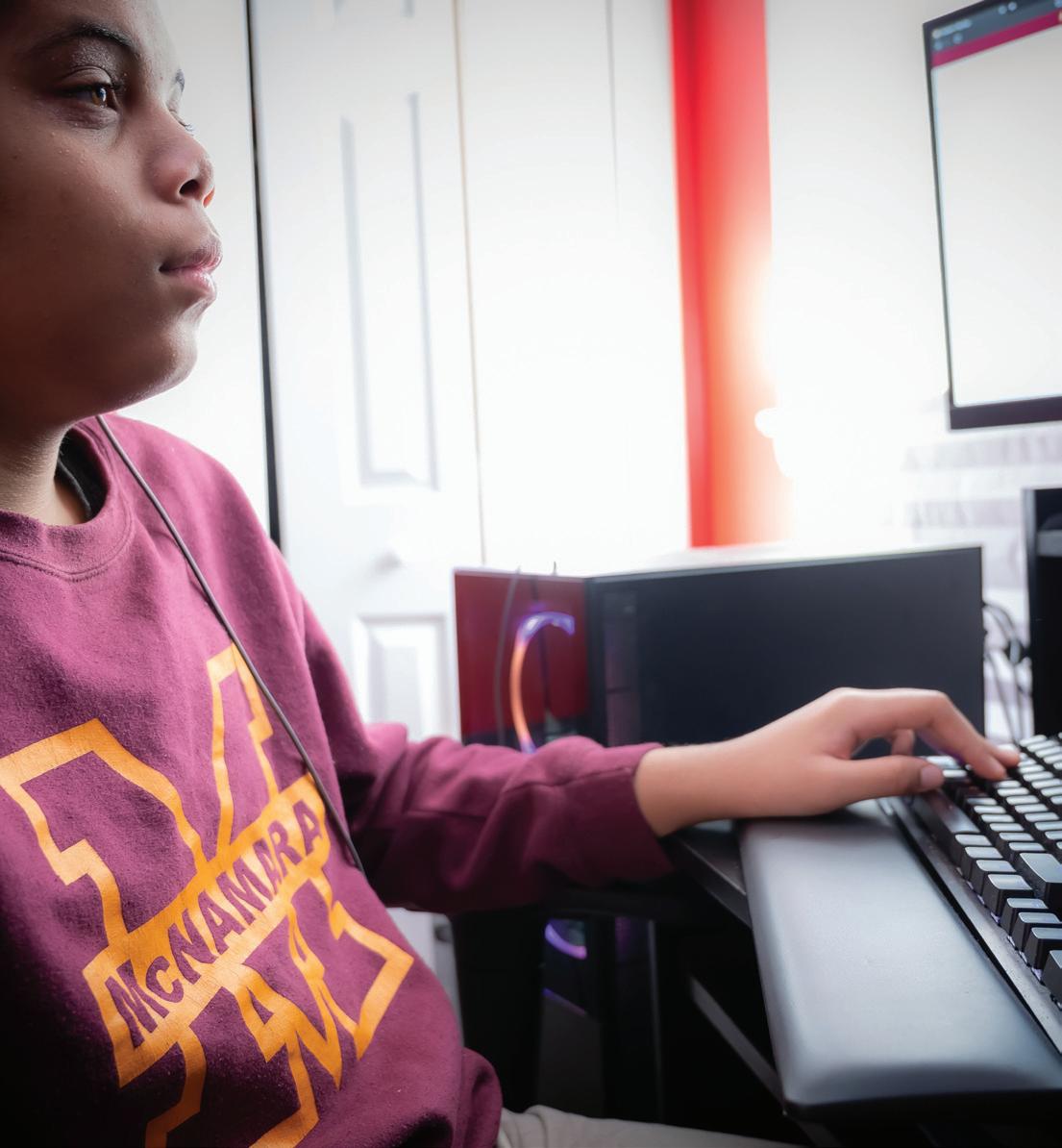
After gathering a lot of valuable input from these stakeholder groups, four stages of operation were developed. Stage 0 represents full virtual learning, Stage 1 represents virtual and classroom learning, Stage 2 represents modified classroom learning where restrictions remain in place for large gatherings, while Stage 3 represents full classroom learning where local officials have dismissed all school related restrictions.
Drawing on the guidelines and safety protocols established by local, state, and federal public health officials and agencies, along with surveying all stakeholder groups within the Bishop McNamara family, the decision was made to operate in Stage 0 at the beginning of the 2020-2021 school year. Bishop McNamara High School has operated in this stage since.
Remaining Committed to Excellence Virtually
Remaining committed to excellence virtually required the reimagining of the concept of school for all members of the Bishop McNamara family. Although the school was well positioned to meet this challenge because it has engaged in various forms of remote instruction since the 2006-2007 school year, and then operated in this way successfully during the latter part of the 2019-2020 school year, starting the new semester virtually, and then maintaining this posture for the foreseeable future, presented a number of challenging questions. “How does the school virtually orient the Class of 2024? How do teachers and students meet their new classes virtually? What is an optimal virtual schedule for instructors and students? How does the school meet the social, emotional, physical, and spiritual needs of its students virtually? How do extracurricular clubs, fine arts groups, and athletic teams meet and move forward virtually?” These questions, and more, drove discussions during the summer months.
Paramount to the school’s decision making was to ensure that Bishop McNamara remained committed to maintaining excellence in a virtual environment. Today, it is clear from a variety of indicators, that Bishop McNamara High School has not only met this challenge, but the school stands as a national leader in virtual education. The school’s frameworks and policies in this area guide and inform many Catholic and independent schools throughout the region and beyond.
The school is proud to claim that our Mustangs have kept learning, growing, and achieving virtually. They remain resilient, eager, and engaged learners. They are a source of inspiration today and moving into the future. Our employees remain committed to their shared vocation as Holy Cross educators. They continue to explore and shape ideas and offer personal and differentiated instruction with zeal and care offered now on the most up-to-date virtual platforms. Bishop McNamara continues to prepare students, as Fr. Moreau had hoped, “for better times than these.” If present today, the school hopes that Fr. Moreau would think that Bishop McNamara High School has met and exceeded his call.
Educating Hearts & Minds Virtually: Remaining Rooted in a Student-Centered Approach
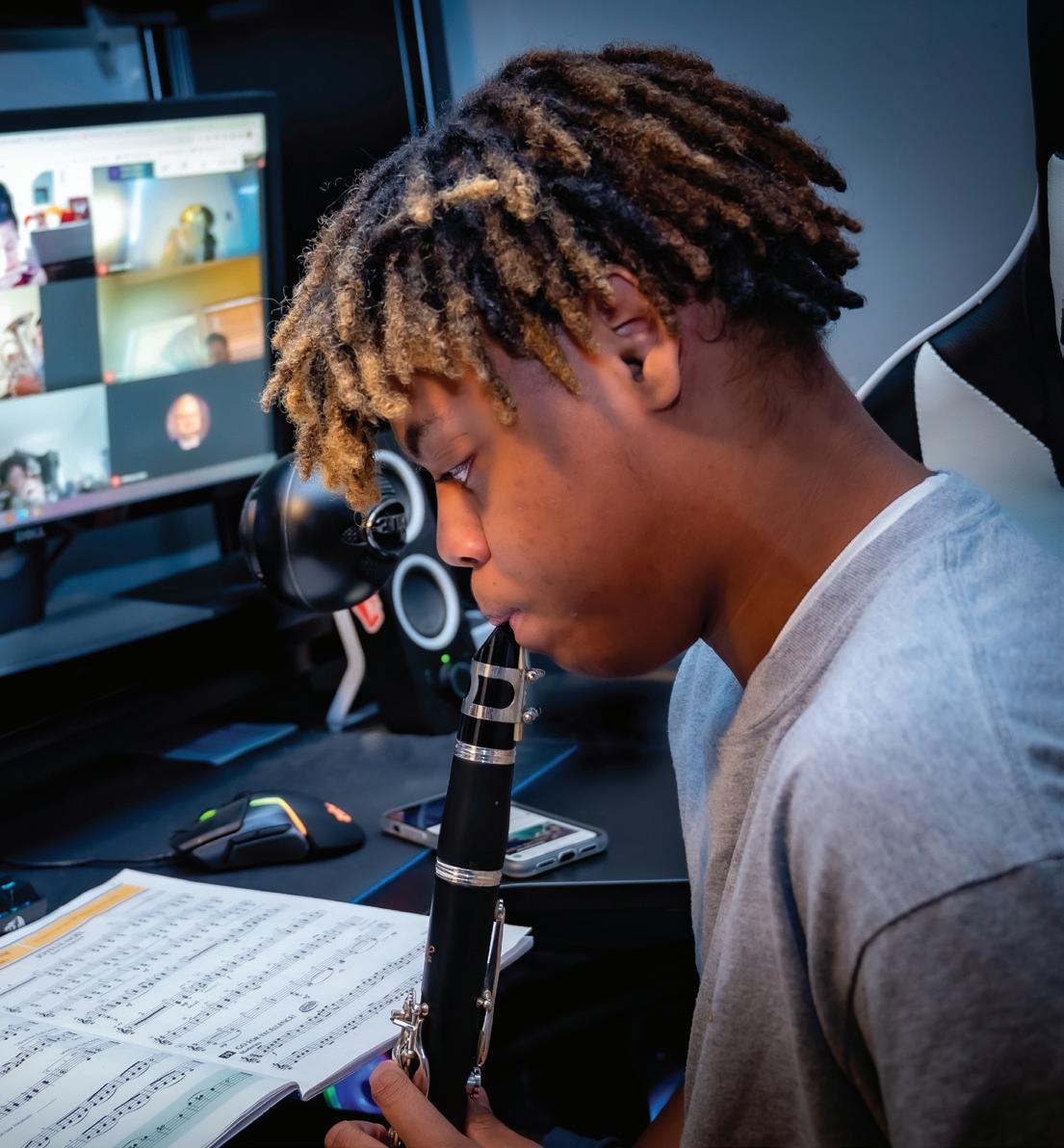
Bishop McNamara High School employs a student centered approach regarding its virtual learning and does so across every academic discipline including Science, Math, English, Social Studies, Information Technology and Engineering, Theology, Modern & Classical Languages, Fine Arts, and Health and Physical Education. Led by Assistant Principal for Academics Charles Shryock and the school’s dedicated academic team, Bishop McNamara instructors, students, and families have access to the school’s Virtual Learning Guide. This guide provides information about Maccess, which serves as the school’s “home base” for posting all lessons, assignments, and more. Students, families, administrators, counselors, and student support teams use this one location to check for assignments, course syllabi, instructional videos, enrichment activities, and collaborative documents across all classes, to ensure students are making progress. The Virtual Learning Guide goes well beyond providing important information and direction regarding these essential administrative functions and tasks. It provides resources and guidelines pertaining to teacher planning and assessment, social-emotional learning tools, tips about how to teach and learn virtually on various platforms, information about how to deal with mental health emergencies, and suggestions for students about how to best use popular learning apps.
Bishop McNamara High School’s outreach remains comprehensive as virtual learning has been supplemented with a host of robust resources. These have been provided by the school’s Counseling Center, Student Support Services, the St. Joseph’s Program for students with learning differences, the St. Andre Program for students with intellectual disabilities, Campus Ministry to meet student’s spiritual needs, robust virtual instruction and coaching offered by the Fine Arts and Athletic Departments, and personal contact by the school’s administration and staff as administrators such as Reginald Brady, Laura Keller, and Herman Gloster ’96 continuously outreach to Bishop McNamara families to learn about how each student and their family are responding and dealing with this unique and challenging historical moment.
Bishop McNamara’s counselors that include Alicia Oglesby, Shamelle Yemofio, Herman Frazier, Michael Jones, and Tia Bell meet virtually with their students according to grade level to discuss their academic performance, but also speak with them about how they are emotionally dealing and coping with the pandemic and other important topics. In addition, students and families access and share learning plans and strategies with the school’s student support instructors and program specialists Abigail Greer, Tierra Jolly ’00, Dee Butler LR ’80, Kevin Clark ’09, Anthony Sosnoskie and Alicia Brown to meet curricular goals. Also, students engage in an array of spiritual resources and meditation activities offered by the school’s Campus Ministry Team Amanda Saunders, Sam Hardwick, and Sandy Herndon. In addition, Bishop McNamara’s club moderators, fine arts instructors, and athletic coaches hold virtual practices, rehearsals, and discussion forums to enable these formative activities to advance while in Stage 0.
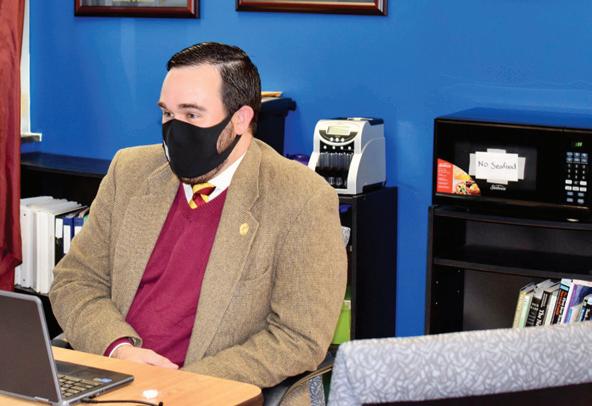
For clubs and activities, Brian Brower, Director of Student Activities and Student Council and Mock Trial Moderator, has enabled club moderators, including himself, and students to meet virtually while in Stage 0. Whether it is groups that he leads such as the Student Council or Mock Trial Team, or other groups and their moderators, such as Abigail Greer’s Women’s Empowerment Club, Jan Steeger’s Science & Explorers Club, or outside groups such as Booz Allen Hamilton’s High School Speaker Series, these clubs continue to work virtually. The virtual workspace has not stopped these important clubs and organizations from meeting and discussing topics important to Bishop McNamara students.

Regarding instruction in the fine arts, teachers have not only held classes virtually, but they have given one on one individual virtual instruction to students regarding their form of art. As Director of Fine Arts and Bands Mr. Anthony Conto notes, “Our students in the fine arts continue to receive instruction at the highest levels virtually. The ability to hold one on one tutorials with students is beneficial to them and their development as artists. Although we miss coming together in groups to rehearse to do live performances, I’m confident that the instruction that they’ve received in Stage 0 has advanced their skills as vocalists, instrumentalists, dancers, visual artists, and performers.”
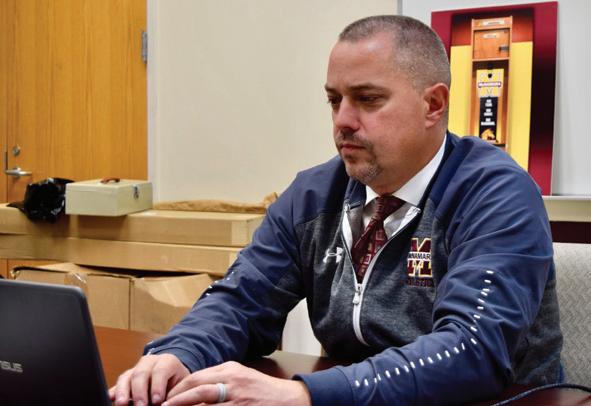
The Bishop McNamara Athletics Department has worked diligently to enable coaches to hold socially distanced workouts and practices throughout the fall in preparation for their upcoming seasons, which have been rescheduled to begin in January, 2021. Members of the Washington Catholic Athletic Conference (WCAC) agreed to postpone athletic contests and games until January. The first WCAC season to be held this school year will be winter sports such as girls and boys basketball and wrestling. Winter sports teams will compete for two months only among other WCAC schools. Teams that typically compete in the fall are scheduled to have practices and games during the months of March and April. Then, in May and June, teams that typically compete in the spring season such as baseball and softball will hold these competitions during this time. Director of Athletics Marty Keithline and his staff, including Assistant Athletic Director and Head Football Coach Keita Malloy ’89, Assistant Athletic Director Dr. Jessica Nash and Athletic Trainer Stephanie Tong have worked with the Administrative Team, coaches, parents, and student-athletes to insure that during the school’s operation in Stage 0 that individual and team workouts have remained socially distanced and that all safety protocols put in place to mitigate the spread of COVID-19 have been maintained. As Mr. Keithline says, “The entire Athletics Department has done an excellent job to meet this moment. This includes my assistants, coaches, administrators, parents, and student-athletes. Their cooperation and commitment to keeping the community safe has been incredible and I’m so proud of Bishop McNamara Athletics.”
What Does a Virtual School Day Look Like at BMHS?
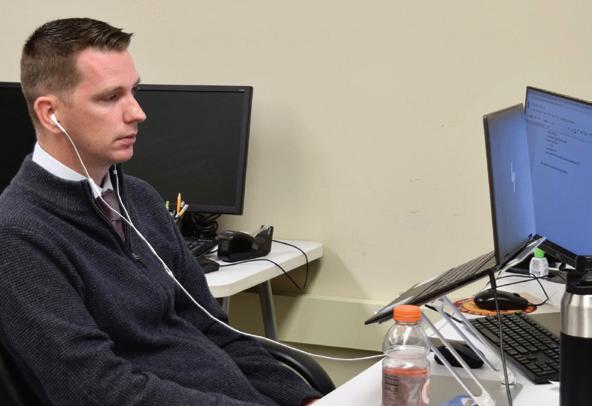
Virtual learning days in Stage 0 begin with Principal Carter and invited guests doing the morning announcements via a Zoom broadcast starting at 8:00am. The announcements include student composed prayers, the Pledge of Allegiance, the School Code, and pertinent information about the day’s events. To make everyone feel a closer connection to the school, Principal Carter does the morning announcements each day from a different location on campus. On Friday’s, WMAC Moderator and Emmy award winner Lou Holder and his team of students do the “Friday Flow” edition of the morning announcements. This group of Mustangs do a pre-recorded edition of the morning announcements that relays newsworthy events and interesting topics relevant to the Bishop McNamara community. It’s a great way to start the day!
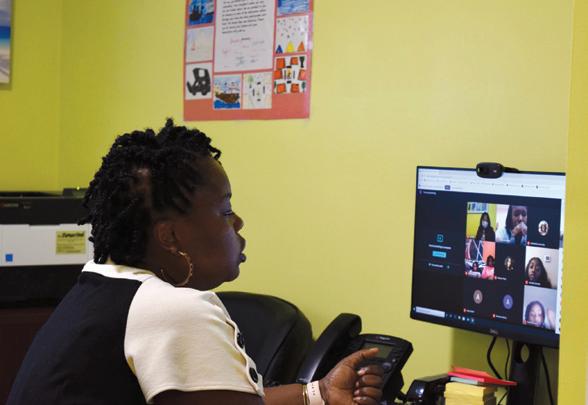
Teachers begin live instruction starting at 8:15am. A student has four virtual classes each day that meet for forty-five minutes per class on the familiar Maroon and Gold rotating schedule. A school day in Stage 0 ends at noon and is followed on Maroon days with a twenty minute event called Mustang Mix, which provides students with another support group of approximately twenty students gathered by faculty and staff moderators to discuss social emotional challenges or simply to be with each other virtually to reduce the feeling of isolation caused by the pandemic.
Instruction in Stage 0 takes place synchronously to attain optimal learning outcomes. Synchronous instruction allows for an instructor to meet with students in real time so that they can give lectures, show and demonstrate skills, and field live questions. The platform that the school currently employs to do live instruction is Google Meets. Assignments are due, at the earliest, by 11:59 pm of the next school day. Bishop McNamara instructors are advised to make direct instruction short and rich to ensure participation and completion. This class schedule includes a robust extracurricular program that starts at 12:45pm and lasts until 1:30pm. Students have the freedom to study and connect with teachers, while faculty continue to support at-home responsibilities through virtual work, between 12:30-3:30pm.
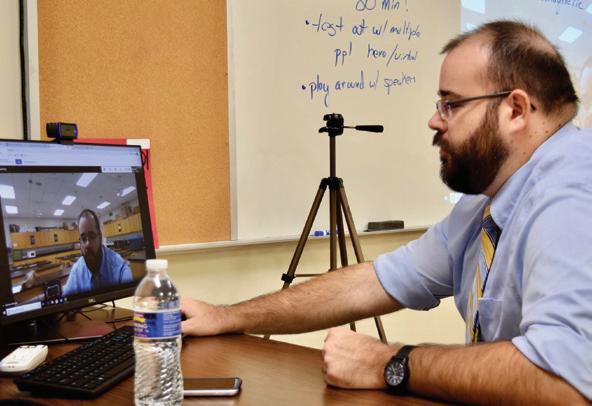
When asked about what has worked well regarding virtual teaching and learning in Stage 0, Joseph Dorsey ’23 said, “The time for classes and the breaks we get in between classes has worked well so far regarding virtual learning and teaching.” Another sophomore student Alexandra Monell ’23 noted, “The amount of time that classes are has worked much better this year compared to last year.” This was a familiar refrain among other students and a wise prudential judgment by the school. Stage 0’s independent schedule recognizes that learning and teaching in a virtual environment are very different than in person learning and teaching. Although the school has worked hard to create opportunities for students to get together virtually, such as class movie nights and Mustang Mix, there is no doubt that, as Joseph Dorsey ’23 says following his earlier comments, “The greatest challenge is not being around other people.” This sentiment was echoed by many other Bishop McNamara students as well as the entire community. There is nothing like being personally together with your Bishop McNamara family.
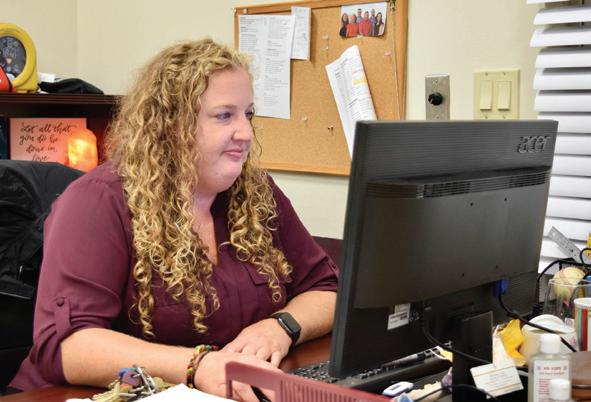
Indeed, this is particularly true for Bishop McNamara’s newest family member - President/CEO Dr. John Barnhardt. With his official appointment as the school’s fourth President/CEO in June, he has led and guided the Bishop McNamara community through this difficult time with patience, transparency and a welcoming spirit. Since June, he has been meeting various audiences virtually, including students and parents, and limited audiences personally such as faculty, staff, and advocates of the school’s Faith. Family. Future! Capital Campaign as the school continues to move forward with plans to build the La Reine Science & Innovation Center. Dr. Barnhardt has still yet to lead an in person all school assembly or visit in person an engaging classroom full of bright and engaging Mustangs. Even his Installation Mass with the recently named Cardinal elect Archbishop Wilton D. Gregory in October had to be held virtually. Yet, he has met this leadership moment to make the safety and well-being of the entire community paramount regarding his decisions about the school’s proper stage of operation. The Bishop McNamara community looks forward to the day when we can gather together as one family to thank him personally, along with the rest of the administration, faculty, and staff for their incredible work during this unprecedented time.
As the school edges closer to 2021 and remains in Stage 0, Bishop McNamara High School’s comprehensive response to educate and teach virtually resulting from the COVID-19 pandemic remains grounded in its mission to educate hearts and minds in a dynamic, inclusive Catholic school community rooted in the Holy Cross tradition. Inspired by its vision to form empowered leaders, inspired by the Gospel, who transform the world, the physical closure of the school’s campus and operation in Stage 0 has not prevented Bishop McNamara from advancing its vision or fulfilling its mission. The Bishop McNamara community continues to make God known, loved, and served. The school remains for its students, families, employees, and alumni a community committed to excellence. The Bishop McNamara community continues to innovate, transform, and thrive, thus serving as a source of inspiration for those within our community and beyond. As the school community says each day, “We are Bishop McNamara. We are Holy Cross. We choose, through our words and actions, to build family, show respect, educate our minds and hearts, and bring hope. We choose to think with Christ.”

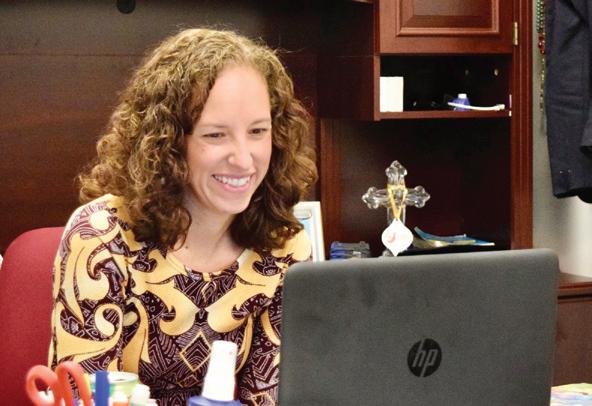
BMHS Remains Committed To Excellence In A Virtual World










